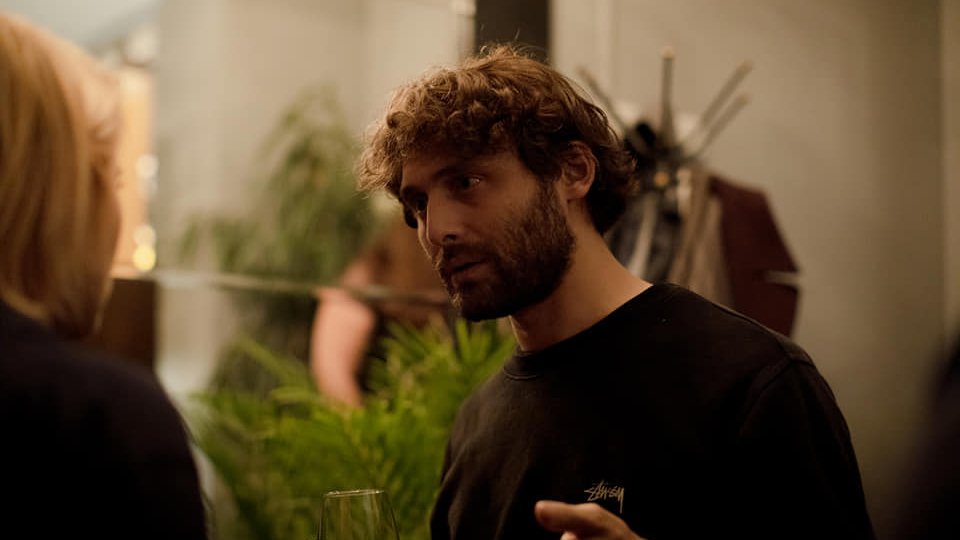Russian media manager and co-founder of Meduza independent news outlet Ilya Krasilshchik quit journalism back in 2019 and focused on managing the food delivery service of Russian tech giant Yandex instead.
However, after the war in Ukraine broke out, Krasilshchik left Russia and announced his exit from Yandex. Shortly after that, he founded Helpdesk.media, a project that offers support to people affected by the actions of the Russian government. Eventually he was also hit with criminal charges for “spreading fake news” about the army and arrested in absentia.
Krasilshchik’s public activity has been met with controversy on Russian social media due to his former ties with Yandex, his infamous NYT op-ed on the Russians’ collective responsibility for the war in Ukraine and the recent layoffs at Helpdesk.media explained by the lack of funding.
Irina Tumakova talked to the media manager about his decision to leave Russia, the way Helpdesk.media is managed, and, naturally, about collective and personal responsibility.
This is an edited version of the original interview that is available in Russian.
How did this war start for you?
I saw Meduza’s push notifications at 8 in the morning on 24 February. I saw [footage of] plumes of smoke over Kharkiv. And then... I believe all of us felt more or less the same way back then. It’s a feeling of horror when you look at your apartment and realise it’s not what it used to be, not completely yours, you’re going through some kind of paradigm shift.
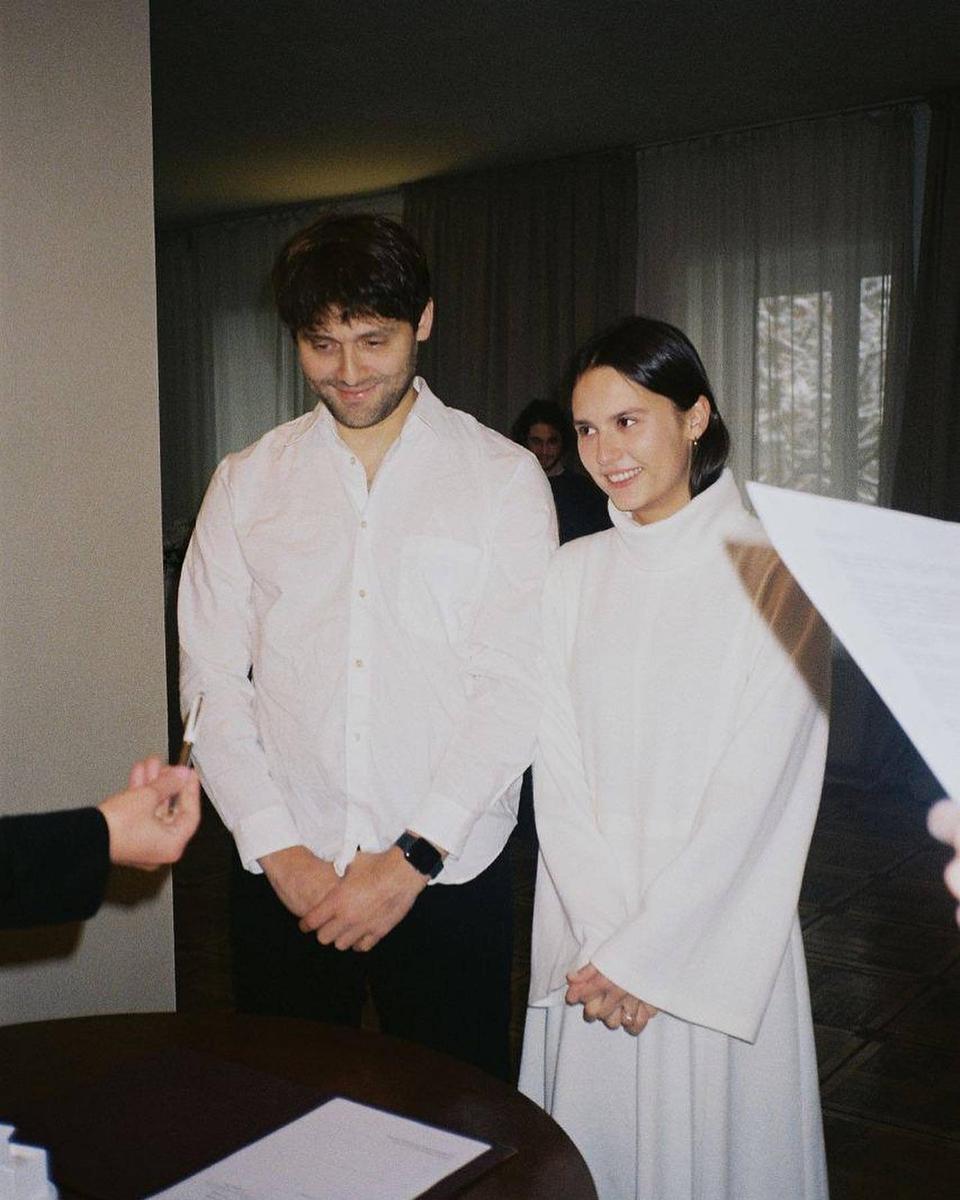
Ilya Krasilshchik with his wife Sonya Arshinova. Photo from Facebook
You spent only a week in Moscow after this. How did you make up your mind on leaving so fast?
There was a feeling of imminent danger. I spoke publicly about what was going on. I was anxious that the borders might shut down. I had a feeling of personal danger, too. And my girlfriend, who is now my wife, wanted to leave as soon as possible as well. I worried about my kids. I wanted to look at what was going on from a safe distance, and then to decide what to do next.
Was it your realisation that leaving [Russia] is a challenge behind the idea to create Helpdesk.media?
I had no specific idea; it all came to me as some kind of an impulse. This is how it happened: I wrote a lot about the war on my Instagram, and after three days my friend and coworker Sasha Polivanov and I decided to run live streams with people from Ukraine. Our first stream of that kind happened on Saturday 26 February. I spread the word, and dozens of people from Ukraine replied, they were ready to talk. Those were people from Irpin, Hostomel, Kharkiv, Odesa, Lviv, Kyiv, Zaporizhzhia, Kryvyi Rih: all sorts of places, and people spoke to us. Our first stream was viewed by 600 thousand people, and we kept going.
Then those streams evolved into me publishing people’s monologues. Volunteers joined us, and they started recording even more monologues. Some of those also had 600–700 thousand viewers. People from Russia and Ukraine started to read this. After about a week and a half, I contacted my former Meduza co-workers who left their jobs there, and I offered to set up a media outlet, because it was unbearable to sit idly by. When it feels unbearable, one should do the thing they can do best. But I wanted to do something bigger than just writing about things, I wanted to help people one way or another.
That was back in March. We realised in May that it was impossible to run a media outlet when I have another separate one: my social media, so we renamed those into Helpdesk. This is how our Telegram and Instagram accounts were created.
Why did you have to lay off some of the employees you hired for Helpdesk.media?
We overestimated our financial capability. We are a young organisation, and it is very difficult to plan your expenditures in the long run. A planning time-frame of three months was fine by us. When it shrank to a one-month frame, it became obvious we wouldn’t make it without a coherent plan in terms of money we can use to keep us running. This is largely due to the fact that we have two organisations in one. In fact, we spend little money on the editorial team, we spend little money on our aid programs, but together it turns out that the budget is quite large, especially for an organisation that is less than a year old. Therefore, we came to the point that we had to dismiss 20 percent of our staff, cut the managers’ salaries, and it was all painful since we didn’t really want to part with any of those people.
You swore off working in the media as you returned to Moscow from Riga [Krasilshchik was a publisher at Meduza, an independent Russian-language media outlet based in Latvia — translator’s note]?
Yes, I did. Who cares what I swore off anyway? I could have sworn off anything not realising that there would soon be a war. I don’t know if I could have acted differently if I realised what was going to happen. The war changes your mindset a lot. It turned out that this media experience I got so tired of, the one I did not want to return to... Although I must admit I missed it a lot. It was a moment of big luck for me since there is your job, there is your audience, and you can do something with it.
Sitting idly without an idea how to apply yourself is far worse. It does not matter if it results in criminal charges and other things; it’s important that there is something you can do.
This isn’t as scary as sitting around thinking about how powerless you are.
And now you, just like many other Russians abroad, are wanted in Russia, and there is a criminal investigation against you...
There is an arrest warrant on my name as well.
Поддержать независимую журналистику
Yes, that’s how they do it these days. Did this happen after your opinion piece was published in The New York Times?
No, it is known precisely how it started, since there are case files. The first reason was my Instagram post from the times when it used to be my personal Instagram page. I wrote that what had happened in Bucha was Russia’s crime, and whoever doubts it is, quote, “an accomplice and a bastard”. Apparently, people were offended and decided to start a criminal investigation against me. I guess it was initiated back on 20 April 2022. Recently, already in 2023, they did an examination of an interview I gave to Ilya Shepelin and doubled down on my charges. Previously, I was facing up to five years in prison, and now I’m facing up to ten years. This is because I was “guided by hatred” and “used my public position”, something like this.
I agree with this, basically: I was indeed guided by hatred, yes. And I used my public position, too, there’s no denying that.
So are the charges correct?
Yes, they are well deserved.
You shouldn’t provide them with a full confession, though. But are you trying to say that the opinion piece that caused such a stir in the Russian [media] community has nothing to do with the criminal investigation?
It’s not in the file, as far as I’m aware.
Did the reaction from the people in Russia whom you considered to be on the same side surprise you?
There was this thing that disappointed me, more like. I don’t think many read my piece in English, but I also published it in Russian. There were certain words that were not edited, unlike in the English version. And those words were like red rags to a bull. I don’t remember what the words were exactly, but it seems to me those were revolving around the notions of “responsibility” and “guilt”.
And your words that Russians have “failed as a nation”.
This is because most of the people did not bother reading the article and locked in on this phrase. And on the fact that it was published by The New York Times. There was a whole lot of hatred, people would tag me and write awful things... I don’t recall being surprised, but it has never been as bad as this for me on social media. Speaking of that article, maybe if we ignore some of the words and phrases that may have been incorrect, I think the same way now, too. Yes, we have failed as a nation.
Reading the full article leaves a different impression of that phrase compared to what it sounds like separately.
People interpret this as if I was blaming all of us for the war, they think I say that they started the war. I don’t accuse people actually, I literally say that there are criminals who did all of this, and there are other people. We failed because the war started. The fact that this happened discredits us as a country. This does not require any insight or close reading. It’s enough to speak to some non-Russians, to listen to someone who doesn’t support Stalin, unlike many people in Georgia, unfortunately. Or someone who isn’t a daydreamer or an enraptured moron who believes that Russia is about bears and Putin has the right to defend against NATO.
If we look at the liberal-minded people, it becomes obvious that Russia has actually discredited itself. Everything we’ve been doing is now discredited.
Of course, different people are not equally responsible for this. There are people you can hardly blame for anything. Since this war has happened, that means something went wrong. This does not necessarily mean that we did something wrong. We need to figure out what exactly went wrong and how to never let it happen again. We have to document this failure to avoid such failures in the future.
What I’m reading is opinions that go “I have nothing to do with this”. There’s one PR guy, he has always worked in PR for various companies, including VK and Beeline, and he says: we did everything to stop this war from happening. And I wonder: what exactly did you do to not make it happen? Of course, I can’t force this responsibility upon people, but I’m very disappointed that people waive responsibility completely.
So, they form an endless circle of irresponsibility. People say: we just lived our lives. Business people say: “What could we have done after all? We would have simply ended up in prison”. We may recall the conversation between [Russian music producer] Iosif Prigozhin and [oligarch] Farkhad Akhmedov. Take [Russian oligarchs] Petr Aven and Mikhail Fridman as an example, did they actually speak up on anything apart from complaining about not being able to pay cleaners’ wages? They couldn’t do anything either since they have no influence over Putin.
Next in line are politicians. I mean, they can barely be referred to as politicians; let’s say officials. They have seats in the Security Council, we saw them days before the war started. They are nonentities. And finally, there is the president who says: we didn’t start this war, it’s all Anglo-Saxons. So, everyone passes the buck. You know, it’s like when there is some kind of a crisis at work, you start asking people about things, and all they do is point at each other, nobody is willing to claim the responsibility. It turns out there’s no one to blame.
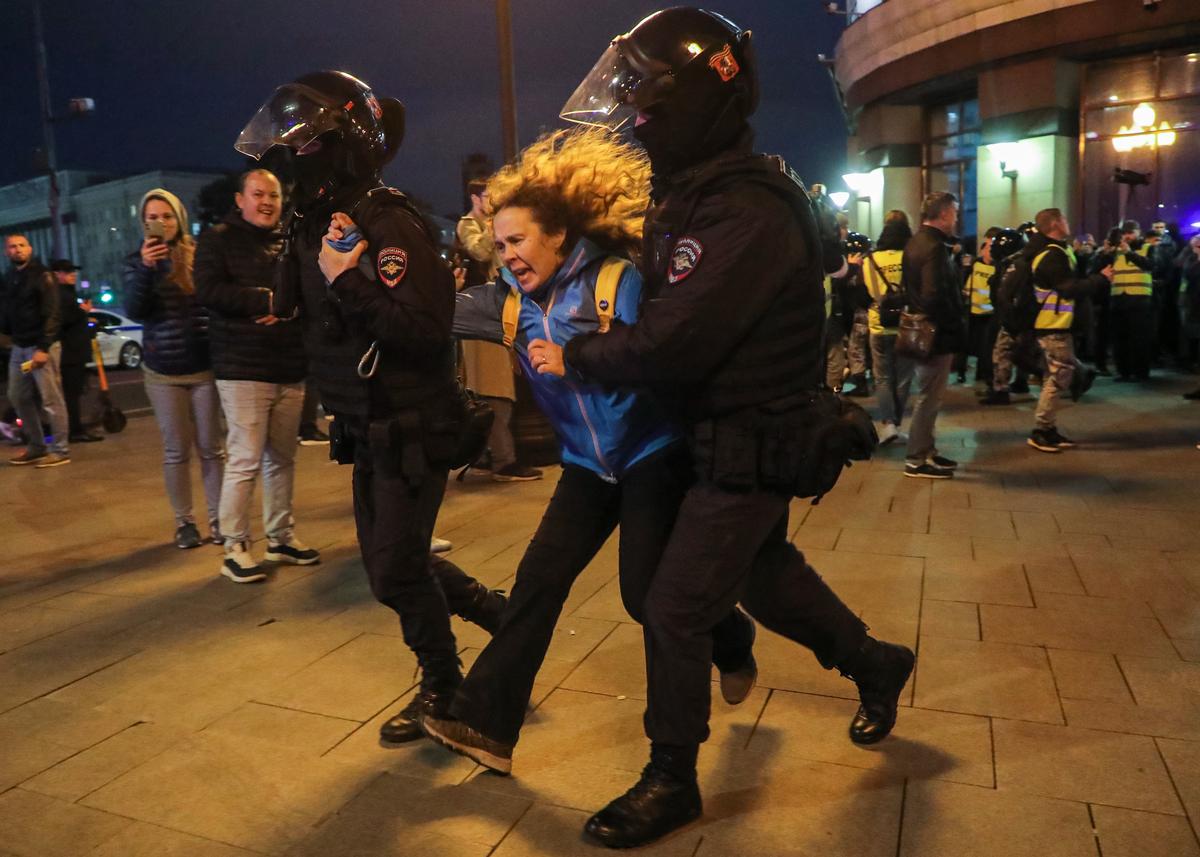
Protest against partial mobilisation, Moscow, 21 September 2022. Photo: EPA-EFE/MAXIM SHIPENKOV
What’s your personal responsibility exactly?
Yes, that’s what I wanted, to start with myself. I can feel my responsibility. I cannot measure it in any way, I don’t know how to do it. It’s just that I feel this responsibility.
What for? Anyone can tell you that: “What could I have done, what could you have done?” and they would be more or less correct. I don’t mean people of our profession, we had the chance to write about all the things that were actually happening in Ukraine, and Novaya did exactly that. But in general, what could have people done even if they knew there would be a war on?
Let me start with myself anyway. If I knew the whole thing would end up in a war... I mean, I didn’t know that, certainly, and it was my own misapprehension. If I told myself frankly that the situation was getting worse too fast, maybe I would have changed my mind about being tired of the media, about returning to Moscow, about changing my line of work. Maybe I wouldn’t have worked on 15-minute grocery delivery for three years, and done something else. My feeling of responsibility lies somewhere here.
By the way, I used to help set up rallies in 2011–2012. We were all thinking that we would protest in a peaceful rally, smile at each other, exchange ribbons, and watch the regime fall. Maybe we should have treated this differently. This strategy was somewhat counterintuitive. Do I feel my responsibility? Of course, since I was one of the people who used to set up those rallies, no matter how old I was back then. I do.
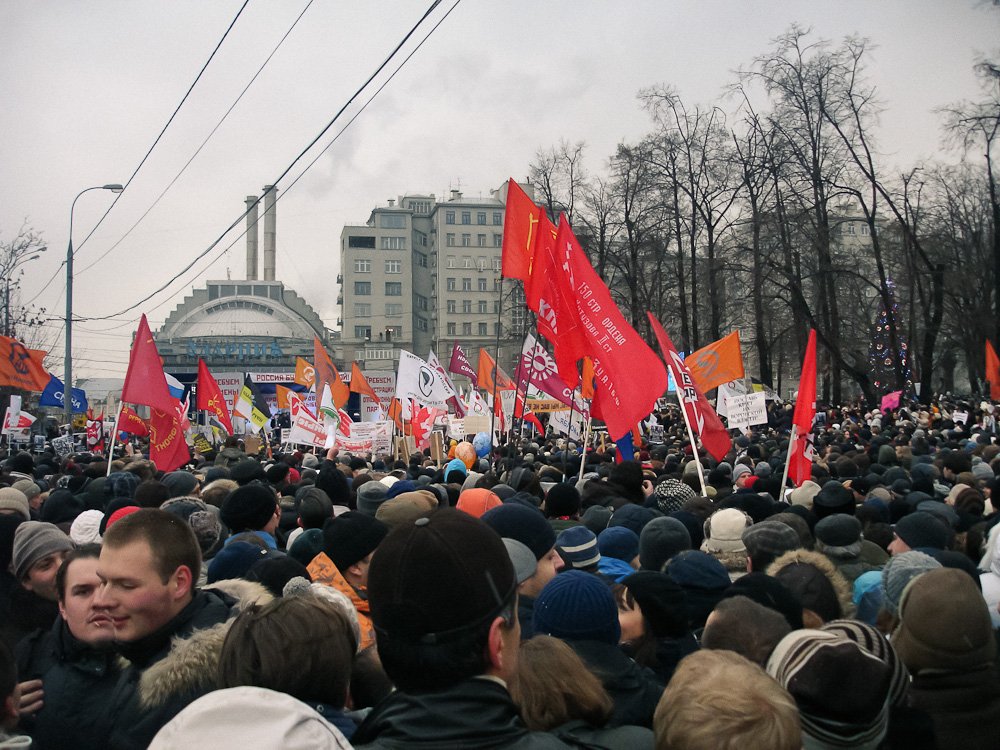
Rally in Bolotnaya Square in Moscow, 2011. Photo: Wikimedia Commons, CC BY-SA 3.0
Do you believe any person can find a moment like this in their biography: say, in that year I did something wrong, but could have acted otherwise and prevented the war from happening?
I do not think any person can do this, no. Of course, not any person. A person with a disability from a small city... I do not want to generalise. Any generalisation has an element of cruelty, a sort of radical anti-empathy, so to say. You can’t paint everyone with the same brush. But there are people who are responsible, yet nobody admits it in their regard. Everyone did everything right. How come then? Everyone did everything right, and yet here we are.
And there were plenty of such situations. They destroyed TV and the parliament back in the 2000s. For how long have we had no normal, structured opposition? I do not mean the “systemic opposition” like the LDPR party, I mean real opposition, the one with political representation. The answer is twenty years. The longer it lasts, the harder it is to change something about it. But there was this moment when certain things could have been changed. Did anyone want this? Some did, and some did not. Do we have any people responsible for the country? In my opinion, we do. But again, there’s no way of measuring it.
Anyway, I’d like to speak of something positive. There are people who did a lot after all. The thing is: they acknowledge their responsibility, and this is why they started doing even more. It is remarkable that the people who actually did something take the responsibility. For instance, musicians who left the country and now collect donations for Ukraine or work as volunteers. Some have opted to stay and are now doing activism in Russia. And those who demand that they be allowed to live their former normal lives, they say: we have nothing to do with it. I believe they have a lot to do with it, actually.
This is very much like Nazi Germany where the war generations had been saying that they had nothing to do with it, that they were the victims, for decades. In a certain sense they were victims, certainly. Are Russians Putin’s victims? Of course, they are.
Obviously. But don’t these people have their own identity? Why do these people give up their identity so easily? I don’t get it.
There is a weird contradiction. On the one hand, a lot has been said and written in Europe and in the world about how many people in Russia are already in prison for anti-war protests, how many are still under criminal investigation or fined, so, it is clear that many people resist the war, although it is very dangerous. On the other hand, people from Europe say: it isn’t Putin’s war, it’s Russians’ war. Why do people from all over the world notice one side of the coin here, and do not see the reverse side? Why do people place responsibility on everyone, even those who are in prison or forced out of the country?
I see no contradiction here. There is a range of opinions. Some people speak about some general responsibility, but I do not agree with that. By the way, this is why I feel more comfortable in Germany than in Georgia. We are being perceived as representatives of an empire in Georgia, and I wouldn’t want to argue with this, because Georgians suffered from the empire in 2008. I have a completely different feeling in Germany, though. On the one hand, I am a Russian national, on the other, I am a Jew, and there are many places in Europe where Nazi Germany killed my relatives. When Germans say something about why Russians do not stand up against Putin, I have things to respond with. The answers are in German history.
It seems to me that when people blame all Russians at once, there is also a kind of spiritual deafness in this. But this does not negate the fact that Russian citizens in general are not being perceived that well right now. This is the tragedy:
you’re not able to change anything, and people from another country give up their lives in a fight against your president’s regime.
The only people who are really fighting Putin right now, in a big way, are Ukrainians, they are the only force that poses a threat to the Russian regime.
There are a lot of things to be said about this. But when it’s been instilled in you for 20 years that you cannot do a thing and will be sent into prison if you dare try, when they can send you to prison for 25 years, there’s no way people would protest. Only in movies are there protests under such regimes. Those protests happened in Iran, but there was zero result.
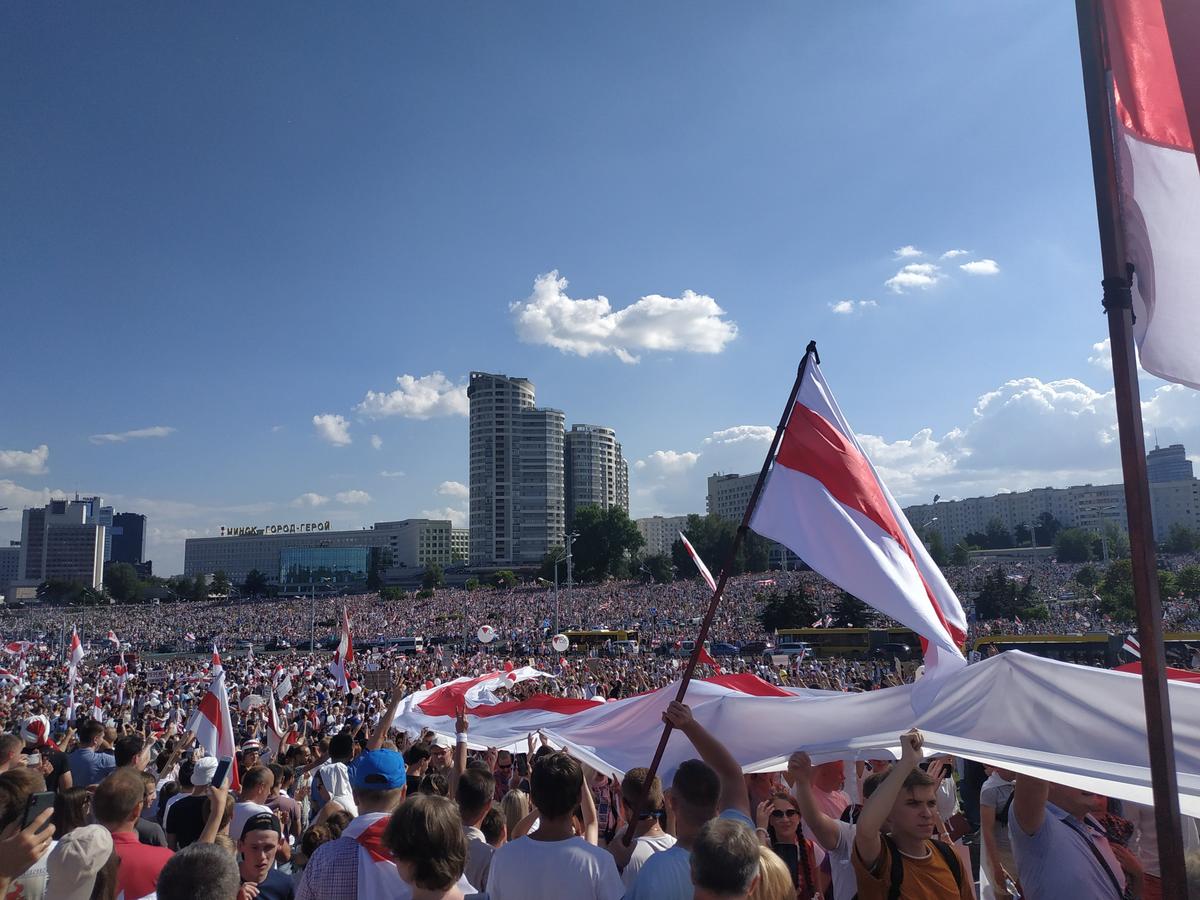
Protest rally in Belarus, August 2020. Photo: Wikimedia Commons, CC BY-SA 4.0
What about Belarus? There was a hell of a protest out there.
Look, the most unfair thing that happened during this war is what happened to Belarusians. There were massive protests in 2020; they failed to overcome, but they showed what kind of people they are, and the entire world sympathised with them. Then the war started, and they were all forced to carry this burden of responsibility for it. This is what I believe to be genuinely despicable. Look, we can’t say that there is some “evil axis” that goes against the just world where everything is right. Things cannot be this way. People are different everywhere, and societies are complex everywhere, too. I feel like I’m saying the most banal thing ever.
It’s okay.
It’s just that everyone is so scared and in trouble now that people tend to oversimplify things. There is a common belief that the West doesn’t like Russians. But it’s enough to travel around Western countries to find out that the approach is different everywhere. Moreover, it is different even within the countries that Russia considers most unfriendly, such as Poland. Listen to the people: they do and say very different things. If you come to Germany, you’ll even be treated with sympathy there.
I also noticed that in no other country where people understand us as much as in Germany. Germans clearly remember certain things.
There you are. At the same time, there are also other Germans who say “why don’t you take the streets”. And there are also people who say “Putin is in the right, it was the West that led him into a trap”. Not everyone understands that this person is so [crazy] that some kind of NATO borders mean nothing to him... This is some kind of delirium. What does NATO have to do with this?
On the other hand, they do not take into account that those countries that are now NATO members fled there because the Germans once captured them, and then they were parts of the Soviet Union or its allies, and for them NATO is, in fact, the chance to defend themselves, because they realise that this menace is real.
This is what they talk about when they say “not everything is that simple” [a phrase used a lot in Russian propaganda — translator’s note].
Nothing is completely black or white in this world, there are a lot of things that aren’t simple. But the fact that a great evil thing has happened, that Putin is a war criminal, is pretty much definite. There are certain ambivalent things around this, but this exact thing is absolutely definite. The fact that there are things that are not black-and-white and more complex things does not cancel out the fact that there are also black things and white things. There is ultimate good, and there is ultimate evil. Yes, there is a gradient, but on the margins of this gradient are things that are pretty much definite.
What do you think the future is going to look like for people like you? I mean people who were forced to leave and are facing criminal persecution in Russia, in addition to many other threats “in absentia”. What’s going to happen to you next?
I have never been much worried about the future. Maybe that is my mistake, but it’s a simplification that helps me a lot in my life. I live in the “do what you do, come what may” mode. I have seen quite a lot of things that changed absolutely everything in life, so it seems absolutely meaningless to me to talk about the future; a lot will probably change. Otherwise, you will be like a centipede that has suddenly forgotten how to control its legs. I can only do what I’m doing now, and reflect on how it affects what’s going on.
Делайте «Новую» вместе с нами!
В России введена военная цензура. Независимая журналистика под запретом. В этих условиях делать расследования из России и о России становится не просто сложнее, но и опаснее. Но мы продолжаем работу, потому что знаем, что наши читатели остаются свободными людьми. «Новая газета Европа» отчитывается только перед вами и зависит только от вас. Помогите нам оставаться антидотом от диктатуры — поддержите нас деньгами.
By clicking the Support button, you agree to the processing of your personal data.
To cancel a regular donation, please write to [email protected]
